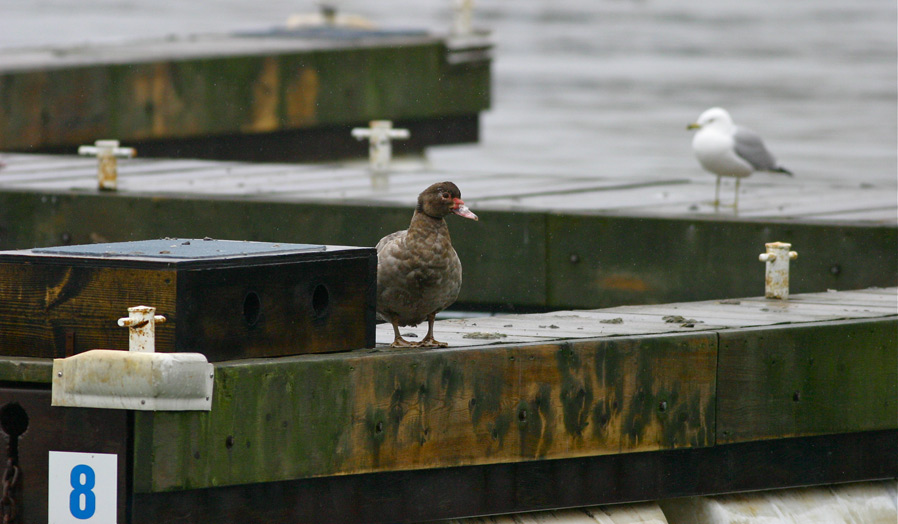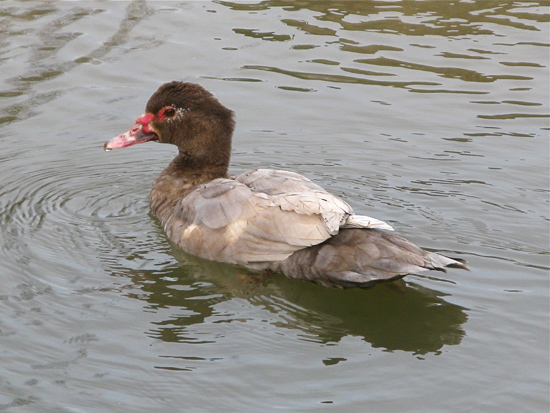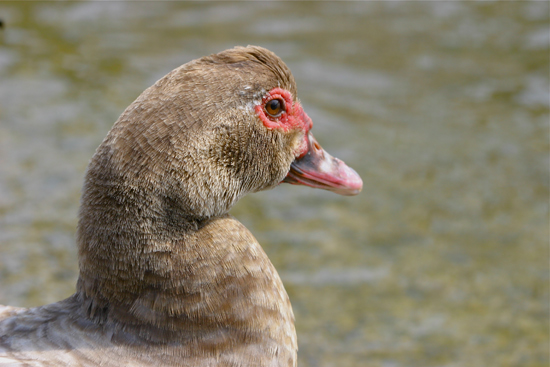

Hershey standing all alone, far out on a pier at ABYC, March 2009 © BCP 2010
Hershey the plucky mystery duck
A rare chocolate and white waterfowl on the prowl captured our bird lover’s gaze … but what is it?
(Longer version of story published in The Toronto Star, April 28, 2009)
Did someone lose a pet duck? Or dinner?
One day last week, when I was taking my usual walk along one of Toronto’s eastern beaches, I happened to come eye to eye with the most unusual waterfowl I have ever seen. This curious creature was about the size of a barnyard chicken, had the webbed feet and bill shape of a duck, and red fleshy bits on its bill like a turkey. Could it be one of the legendary turduckens I had heard kids joking about?
I had neither field guides nor camera with me, so I zipped home to get both. I wanted to get a picture of the unknown subject before it flew or paddled away. A thumb through my handbooks — the Peterson’s, Audubon and Smithsonian guides for North American birds — just deepened the mystery. I could find nothing that looked like my bird.
Back at the beach, I grabbed some pictures in a hurry — I might never ID the critter, but at least I could tell my grandchildren about it someday.
Now home with my photos, I went through my field guides again. Slowly.
In the first few books I found nothing remotely similar to the bird in my picture. But then, in the Smithsonian book, there was a duck that warranted a closer look. Its red, warty-looking growths on its bill and face looked a bit like those of my mystery bird. But the wild duck in the book, called a muscovy, was solid black, whereas Bird X was a delicate café au lait flecked with foamy white.
There was something else wrong that made my identification suspect. Wild muscovies are found south of the Rio Grande, their native habitat running from Mexico through the warmer, wooded habitats of Central and South America. If my cappucino-coloured creature was a wild muscovy, she took a seriously wrong turn on her flight path. A wrong turn of more than 3,200 kilometres, if you use the Rio Grande city of El Paso, Texas, as the starting point.


Hershey paddling near the boat ramps at Ashbridge's Bay Park, March 2009. © BCP 2010
Nevertheless, it felt like the puzzle was unravelling. Comparing my photo to pictures in Google images soon gave me an answer. The mystery bird matched pictures of a particular breed of domesticated muscovy ducks known as “chocolate.”
According to Ducks in the Wild, written by ornithological expert Paul A. Johnson, muscovies have been domesticated for at least 500 years. In recent years, domestic muscovies have been bred into a huge variety of exotic colours including, lavender, blue, white, pied, calico — even chocolate ripple.
With this information in hand, there was now no question. Beach birdie, quickly dubbed Hershey, was clearly a chocolate muscovy.
Turns out these odd-looking ducks with their large, heavy bodies and stubby legs are prized as farmyard — and even backyard — pets. Their chief attributes seem to be that, unlike, say, roosters or geese, muscovies are quiet. They’re also hardy, easy to raise, and have a most useful appetite for flies. But perhaps it’s their charming habit of wagging their tails, combined with their unusual head movements (Egyptian-like, people say) that has endeared them to so many. They’re also reputed to be quite intelligent, to the point of even coming when called.
But where muscovies really shine is dinner. Being tasty and lean — they’re said to have less fat and fewer calories per pound than turkey — muscovy is cooked dozens of ways, appearing in recipes from paté to entrée platters. Peppercorn-crusted breast of muscovy duck with blueberries, anyone?


Dear sweet Hershey. Always had a passionate coo that could only mean, "Hello, I missed you. Where's my grub!" © BCP 2010
Which brings me back to Hershey. What was she doing at the beach, anyway?
My guess is that rather than dinner that got away, Hershey was someone’s pet. Someone who once had an adorable little chick that grew into a large — oops! — headache. Perhaps that someone waited until the weather was a bit milder, then decided to drop young Hershey off at the lake to fend for herself?
However Hershey got to the beach, she seems to be holding her own, at least for now, spending her days alone on the very same pier occupied a year ago by the lonely female wood duck that came to be known as Chilly.
Hershey comes when I call her, as if she is quite accustomed to being called at chow time on the farm. And she ravenously devours the special poultry feed I offer her.
While muscovy ducks have a reputation for being hardy and able to fend for themselves, animal husbandry folks on the Internet tell me it’s unlikely she will survive, especially over a harsh Toronto winter. She doesn’t seem to know how to get her own food, for starters. And there are just too many predators that would enjoy a lovely duck dinner, with or without the blueberry sauce.
The story of Chilly the wood duck had a happy ending. Will Hershey’s?
© BCP 2010
Hershey story update, March 22, 2010:
The story of Hershey ran in the Star in 2009 with a tag at the bottom that asked readers to contact the author if they could provide a safe, loving home for Hershey, who I feared would not be able to survive on her own. I had lots of offers from very kind readers. After contacting them all back, I settled on a wonderful offer from a woman who has a farm towards Collingwood. She gave me lots of details and it was clear Hershey would have a terrific home with her other ducks and animals in her barn. Since the weather was warm, and Hershey did not seem to be in imminent danger, I got a friend to feed her while I had to go out of town for three weeks.
When I got back from my trip, I went straight down to the parking lot at Ashbridge’s Bay, and started calling for Hershey. After about five minutes of me calling her name, she flew into the parking lot and landed on the water by my feets. Then she quickly waddled up the ramp to say hello. She cooed and called and wagged her tail excitedly. It was a hugely warm welcome back for me that melted my heart. I fed her, had a visit and left.
I saw Hershey several more times in late May 2009, then one day in June, that was it. I called and called her, but there was no response. I had to contact the woman who had so generously provided Hershey an adoptive home and tell her that Hershey was gone.
I still look for Hershey, but haven’t seen her since. My hope, of course, is that she somehow found a muscovy mate to hang out with, and she’s busy thinking about starting a new family for 2010, even as I write this.
© BCP 2010


no comments